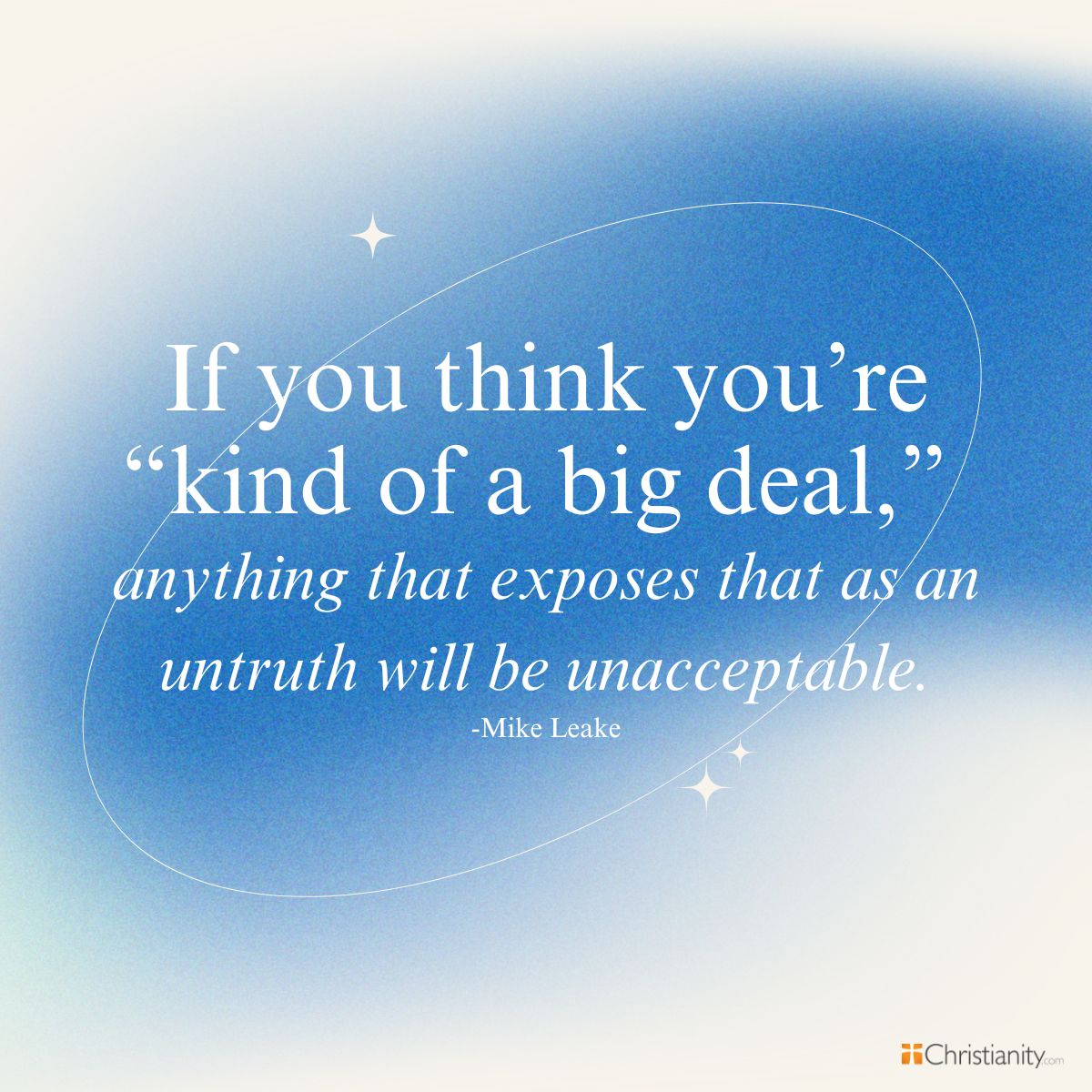Because I don’t take myself too seriously, I’ll begin this article by quoting Ron Burgundy. If you’re not familiar with the character, it comes from a character that Will Ferrell plays in the movie Anchorman. I’m not suggesting you watch the movie, only that if you are familiar, you’ll know that he’s an iconic character who is a perfect illustration of taking yourself too seriously. When he meets his new co-anchor, Veronica, Ron comes on strong:
Ron: I don’t know how to put this, but I’m kind of a big deal.
Veronica: Really.
Ron: People know me.
Veronica: Well, I’m very happy for you.
Ron: I’m very important. I have many leather-bound books, and my apartment smells of rich mahogany.
We laugh at the character because he’s arrogant and egotistical but also oblivious and misguided. Is an anchorman for a San Diego news station really that big of a deal? Yet, I think we may also be able to identify with his heightened sense of self-worth. We can be prone to thinking of ourselves as a big fish in a small pond. Or at least to make that our goal.
In an article at TGC[1], Luke Simon makes a rather compelling argument that our New Year’s Resolutions might signify that we’re taking ourselves too seriously. His argument is that this self-righteousness actually enslaves us. And I think he’s correct. Which has me wondering—what does it look like to take yourself too seriously? And how can I stop?
What Does it Mean to Take Yourself Too Seriously?
There are a few characters in the Bible that are quite obviously taking themselves too seriously. One of these is Haman in the story of Esther. Haman very well could have been Will Ferrell’s inspiration for the character. His life revolves around his own ego and a desire for power. When Mordecai refuses to bow to him, he treats it like the biggest offense in the history of mankind. He devises a genocidal plan to annihilate an entire race of people. Overreact much?
In Haman we can see some of the signs of taking yourself too seriously. For one, his hyper-focus on recognition is a certain sign that he’s rather self-obsessed. Pride has a tendency to magnify small offenses against us. What happens if you’re contributions aren’t publicly acknowledged? Do you obsessively check for likes, comments, or shares to validate a social media post? Do you grow resentful in relationships when your service and sacrifice aren’t noticed? Do you feel discouraged when others are praised, and you aren’t? Do you steer conversations toward talking about your own accomplishments and successes?
Haman also was self-centered in his thinking. When King Xerxes threw a party for Esther, Haman assumed it would be about him. That’s why he unknowingly encouraged the king to lavish gifts upon his enemy, Mordecai. Haman assumed those gifts would be for him. Likewise, we can think the whole world revolves around us. Do you dominate conversations in group settings? If you hear a group laughing, do you immediately assume it must be about you? Are you more aware of the wrongs done to you or things in which you’ve done? Do you make decisions that benefit you or others?
If Haman hadn’t taken himself so seriously, I think he’d have been able to take a step back and laugh at how unbelievably ridiculous the whole story is. But his ego is so fragile that he can’t tolerate even the slightest perceived insult. Dallas Willard once said, “I think a mature Christian is someone who is very difficult to offend.” If you’re easily offended it shows that your identity is still wrapped up in yourself. You’re taking yourself too seriously still. Can you laugh at yourself? Do you cover up your mistakes or try to learn from them? When things don’t go as planned, do you obsess over what went wrong or try to find joy in the unexpected? Do you chuckle at awkward moments or cringe?
If you think you’re “kind of a big deal,” anything that exposes that as an untruth will be unacceptable. In that TGC article, the author talks about taking Jesus seriously. I think that is wise. But I think we need to make sure what we mean by “serious” isn’t synonymous with dour. Basically, we acknowledge that Jesus is a big deal. He is where we find all of our worth, etc. That is what it means to take Him seriously.
Sometimes, we take our “religion” seriously, and it makes us just like Haman—but with the name of Christ glossed over our own self-righteousness. If your relationship with Jesus isn’t producing freedom, a deeper love for others, laughter, and a humble awareness of your need for grace, it’s worth asking if you’re following the real Jesus or just your own self-made version of Him.

What Are the Signs of Taking Yourself Too Seriously?
What are the signs of taking yourself too seriously? Here are a few:
1. Defensiveness
You can’t take criticism or admit any mistakes without feeling crushed.
2. Controlling
Micromanaging others or feeling the need to fix everything.
3. Joylessness
You can’t laugh at yourself or even the absurdity of life.
4. Self-Pity
Do you like to throw pity parties? Can you name more things wrong with your life or things going right?
5. Easily Offended
Is someone always hurting your feelings?
6. Avoidance of Risks
You won’t play the game unless you know you’ll win.
7. Perfectionist
You expect perfection from yourself and others.
How Do I Not Take Myself So Seriously?
Some people naturally have a more “serious” disposition. But that may not mean that you’re being self-righteous. It all has to do with whether you’re placing your identity in Christ or self. I’ve known people who come across as very serious, but really, it’s just a deep focus. When they mess up, they are able to laugh at themselves. But many of us really need to chill out a little. How do we do that?
The first step is to rightly assess yourself. Though quite delusional, I don’t think Ron Burgundy would be able to keep up the façade if he had an Isaiah 6 experience. We have to accurately view ourselves in comparison to who God is. I suppose if I were to play a game of pick-up basketball with a group of six-year-olds I could convince myself that I’m kind of a big deal. But that delusion would be popped if I had to face NBA players—or, let’s face it, anyone who can touch their toes without making an old-man grunt.
After realizing that you aren’t a big deal the next step is to really drink in the gospel. Jesus is a big deal. And He has accepted you. The more we come to know Jesus and really experience His joy, the more that spills over into our own lives. He provides an immense amount of freedom. And because of this I don’t have to make a big deal out of things. Yes, I need to take sin seriously. But I don’t have to take my finitude quite so seriously. There is humor in our sheer humanity.
That is the theology that must underpin some of the practical tips. You have to let go of perfectionism—even if imperfectly. And slowly learn to laugh at yourself. There is plenty of comedic material there—tap into it. That doesn’t mean that you’re beating yourself up or self-degrading, it just means being honest about our humanity. If you try hitting a super high note without training, there is a really good chance that your voice is going to crack. You can be mortified, or you can laugh. Pick laughter.
Lastly, it's important to surround yourself with people who remind you of the gospel and not your performance. If you’re surrounded by a bunch of people who take things too seriously, you’re going to have the life knocked out of you. Yes, life can be really tough. And we need to have people who are emotionally mature enough to lament with us. But we also need people who are emotionally mature enough to laugh with us. Both of those flow from the gospel.
[1] https://www.thegospelcoalition.org/article/new-years-resolution-seriously/
Photo Credit: ©Unsplash/Gustavo Spindula
Mike Leake is husband to Nikki and father to Isaiah and Hannah. He is also the lead pastor at Calvary of Neosho, MO. Mike is the author of Torn to Heal and Jesus Is All You Need. His writing home is https://mikeleake.net and you can connect with him on Twitter @mikeleake. Mike has a new writing project at Proverbs4Today.


.jpg)
